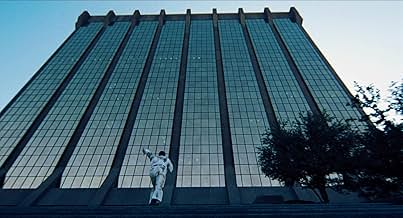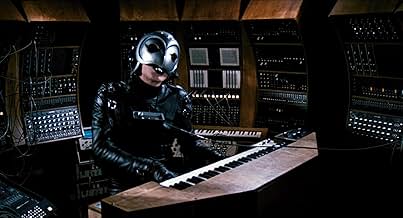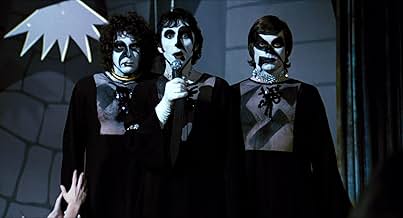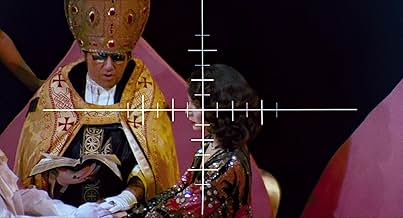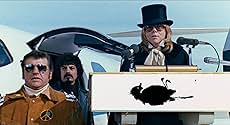Ein entstellter Komponist verkauft seine Seele für die Frau, die er liebt, damit sie seine Musik aufführt.Ein entstellter Komponist verkauft seine Seele für die Frau, die er liebt, damit sie seine Musik aufführt.Ein entstellter Komponist verkauft seine Seele für die Frau, die er liebt, damit sie seine Musik aufführt.
- Regie
- Drehbuch
- Hauptbesetzung
- Für 1 Oscar nominiert
- 3 Gewinne & 5 Nominierungen insgesamt
Peter Elbling
- The Juicy Fruits
- (as Harold Oblong)
- …
Empfohlene Bewertungen
"Phantom of the Paradise" is Brian De Palma's outrageous blend of horror, comedy and rock opera very loosely based on Gaston Leroux's immortal novel "Phantom of the Opera". I know it is hard to think of a musical horror movie without thinking about "The Rocky Horror Picture Show", but De Palma strikes first with this more horror-oriented (although still hysterically funny) satire on the music industry of the 70s.
Swan (Paul Williams) is a powerful and legendary music producer who is making preparations for his greatest triumph in music business: The Paradise, a monster auditorium that will serve him as palace. To inaugurate his palace, he is looking for the perfect sound and he fins it in the music of Winslow Leach (William Finley), a young composer who dreams with presenting his "Faust" cantata to the world. Swan steals Leach's work and in an accident, deforms his face turning Leach into The Phantom. Now, as the masked monster, the Phantom will try to stop Swan's plans by sabotaging the Paradise.
The movie is a visually and musically impressive rock opera with a healthy dose of horror and tongue-in-cheek humor. Brian De Palma cleverly conjures the basic outline of Leroux's novel and add elements of his other influences making the movie a subtle yet moving tribute to the books/movies/music he loves. The modernization and the change from opera to rock work surprisingly good and despite of being a bit outdated by now, the music (by Paul Williams) still makes one of the best soundtracks in a horror film.
De Palma continues improving his technique in this film and like in the previous "Sisters", his style shows maturity and a definitive trademark. Often labeled as a Hitchcock-imitator, I believe that De Palma simply likes to pay constant tribute to his influences, and this film serves a proof of that. Elements of Welles, Hitchcock, Murneau, Whale and Wienne are all over the picture, yet "Phantom of the Paradise" is like none of the works of those directors.
Paul Williams not only composed the soundtrack, he also stars as Swan, the dark and evil genius that leads Death Records and ultimately uses Leach's music for his own purposes. His performance is superb and while not physically imposing he is truly one of the best villains I've ever seen. Finley's take on the Phantom is, like most of the modern interpretations of the character, a romantic tragic figure; but Finley recovers some of the original horror characteristics of the novel creating an attractive but still menacing monster.
Jessica Harper, who would achieve fame in Dario Argento's "Suspiria", gives a good performance as Phoenix, the young singer that captures both Swan and Leach's attention. Like she would do in "Suspiria", she adds depth to the role of the naive singer who wants nothing but to triumph. Something remarkable is the fact that she sang all her songs and did it with credibility and talent. Last but not least, Gerrit Graham portrays a Bowie-inspired Glam rock diva in the unforgettable role of rock superstar Beef.
Sadly, not everything is perfect in Paradise, and neither is in this movie. The odd mixture of musical and horror works very good but at times the movie gets a bit too serious to pass as a musical or too silly to pass as a horror film. It's not a surprise that "The Rocky Horror Picture Show" gained more recognition as it keeps both genres perfectly in equilibrium in all its flamboyant runtime. Still, this is a minor flaw that keeps the movie away from perfection.
Maybe I had low expectations or maybe I was just in the right mood, but "Phantom of the Paradise" was a pleasant surprise that I would not hesitate to recommend to fans of "The Rocky Horror Picture Show" or fans of black comedy in general. 8/10
Swan (Paul Williams) is a powerful and legendary music producer who is making preparations for his greatest triumph in music business: The Paradise, a monster auditorium that will serve him as palace. To inaugurate his palace, he is looking for the perfect sound and he fins it in the music of Winslow Leach (William Finley), a young composer who dreams with presenting his "Faust" cantata to the world. Swan steals Leach's work and in an accident, deforms his face turning Leach into The Phantom. Now, as the masked monster, the Phantom will try to stop Swan's plans by sabotaging the Paradise.
The movie is a visually and musically impressive rock opera with a healthy dose of horror and tongue-in-cheek humor. Brian De Palma cleverly conjures the basic outline of Leroux's novel and add elements of his other influences making the movie a subtle yet moving tribute to the books/movies/music he loves. The modernization and the change from opera to rock work surprisingly good and despite of being a bit outdated by now, the music (by Paul Williams) still makes one of the best soundtracks in a horror film.
De Palma continues improving his technique in this film and like in the previous "Sisters", his style shows maturity and a definitive trademark. Often labeled as a Hitchcock-imitator, I believe that De Palma simply likes to pay constant tribute to his influences, and this film serves a proof of that. Elements of Welles, Hitchcock, Murneau, Whale and Wienne are all over the picture, yet "Phantom of the Paradise" is like none of the works of those directors.
Paul Williams not only composed the soundtrack, he also stars as Swan, the dark and evil genius that leads Death Records and ultimately uses Leach's music for his own purposes. His performance is superb and while not physically imposing he is truly one of the best villains I've ever seen. Finley's take on the Phantom is, like most of the modern interpretations of the character, a romantic tragic figure; but Finley recovers some of the original horror characteristics of the novel creating an attractive but still menacing monster.
Jessica Harper, who would achieve fame in Dario Argento's "Suspiria", gives a good performance as Phoenix, the young singer that captures both Swan and Leach's attention. Like she would do in "Suspiria", she adds depth to the role of the naive singer who wants nothing but to triumph. Something remarkable is the fact that she sang all her songs and did it with credibility and talent. Last but not least, Gerrit Graham portrays a Bowie-inspired Glam rock diva in the unforgettable role of rock superstar Beef.
Sadly, not everything is perfect in Paradise, and neither is in this movie. The odd mixture of musical and horror works very good but at times the movie gets a bit too serious to pass as a musical or too silly to pass as a horror film. It's not a surprise that "The Rocky Horror Picture Show" gained more recognition as it keeps both genres perfectly in equilibrium in all its flamboyant runtime. Still, this is a minor flaw that keeps the movie away from perfection.
Maybe I had low expectations or maybe I was just in the right mood, but "Phantom of the Paradise" was a pleasant surprise that I would not hesitate to recommend to fans of "The Rocky Horror Picture Show" or fans of black comedy in general. 8/10
This is probably one of those ones that most people either love or hate, so there isn't that much point in trying to sell it to anyone. I've been hugely attached to it since it came out. I don't think I'm alone in saying that it's "my" answer to Rocky Horror (which to me is simply "entertaining" - which is no insult). A lot of people seem to really dislike Paul Williams. But, love him or hate him, he threw himself completely into the role of Swan. To me, Swan is one of the best comical or semi-comical villains ever (it took me a long while to think of it, but I wonder whether his use of the word "Excellent" in one scene might have inspired Mr. Burns' line on The Simpsons). Everyone else was very good in it, obviously Gerritt Graham as Beef, and George Memmoli as Philbin. I wish , in the first place, that there were FEWER tongue-in-cheek horror films (or whatever you want to call them), and in the second place, that they were as original as this one.
This viewer feels obliged to point out that his hometown - Winnipeg, Canada - is one of the two cities in the world to truly embrace Brian De Palmas' operatic spoof of the glam rock era. (The other being Paris, France.) Therefore, it's mystifying that it should have taken me so long to finally watch it, but now I'm glad that I have.
It's a thoroughly flamboyant, marvelously designed and decorated rock musical that combines the themes of Phantom of the Opera, Faust, and The Picture of Dorian Gray. William Finley stars as Winslow Leach, a naive, trusting singer-composer who is taken advantage of by conniving producer Swan (who's played by real-life singer-composer-actor Paul Williams). Several circumstances later, the disfigured Leach seeks revenge against Swan while falling madly in love with aspiring pop star Phoenix (the radiant Jessica Harper).
The late, great character star Finley and the engaging Williams were never better than in this funny and fast paced exercise in style. It gets off to a great start with opening narration by none other than Rod Serling. Well shot, by Larry Pizer, and designed, by Jack Fisk, it features some thoroughly catchy ditties by Williams. The parodies of such performers as Sha-Na-Na and the Beach Boys are spot on. De Palma is also most effective at capturing the insanity of the emerging shock-rock trend, especially with the effeminate rocker Beef, one of the all- time best roles for top character actor Gerrit Graham.
Harper is beautiful and extremely appealing and it's a shame that neither she nor Graham nor anyone else here ever became big stars. Williams is great fun, and Finley fully embraces the tragic arc of his character. Heavy set George Memmoli is also solid as Swans' gopher Philbin.
This film manages to maintain that feeling of fun throughout while also being rather sad at the same time.
Trivia note: Fisks' wife, actress Sissy Spacek, who went on to play the title role in De Palmas' next film, the feature adaptation of Stephen Kings' "Carrie", was the set dresser here. And look for such familiar 70s actresses as Jennifer Ashley, Janit Baldwin, Janus Blythe, Robin Mattson, Patrice Rohmer, and Cheryl Smith among the groupies.
Eight out of 10.
It's a thoroughly flamboyant, marvelously designed and decorated rock musical that combines the themes of Phantom of the Opera, Faust, and The Picture of Dorian Gray. William Finley stars as Winslow Leach, a naive, trusting singer-composer who is taken advantage of by conniving producer Swan (who's played by real-life singer-composer-actor Paul Williams). Several circumstances later, the disfigured Leach seeks revenge against Swan while falling madly in love with aspiring pop star Phoenix (the radiant Jessica Harper).
The late, great character star Finley and the engaging Williams were never better than in this funny and fast paced exercise in style. It gets off to a great start with opening narration by none other than Rod Serling. Well shot, by Larry Pizer, and designed, by Jack Fisk, it features some thoroughly catchy ditties by Williams. The parodies of such performers as Sha-Na-Na and the Beach Boys are spot on. De Palma is also most effective at capturing the insanity of the emerging shock-rock trend, especially with the effeminate rocker Beef, one of the all- time best roles for top character actor Gerrit Graham.
Harper is beautiful and extremely appealing and it's a shame that neither she nor Graham nor anyone else here ever became big stars. Williams is great fun, and Finley fully embraces the tragic arc of his character. Heavy set George Memmoli is also solid as Swans' gopher Philbin.
This film manages to maintain that feeling of fun throughout while also being rather sad at the same time.
Trivia note: Fisks' wife, actress Sissy Spacek, who went on to play the title role in De Palmas' next film, the feature adaptation of Stephen Kings' "Carrie", was the set dresser here. And look for such familiar 70s actresses as Jennifer Ashley, Janit Baldwin, Janus Blythe, Robin Mattson, Patrice Rohmer, and Cheryl Smith among the groupies.
Eight out of 10.
This movie is beautiful. Its a consummate midnight movie. Okay, so Paul Williams, Bill Finley, and Jessica Harper may not be the best actors in the world. And sure, the effects, set, camera moves, and acting is SO VERY seventies, but that doesn't take away from the most beautiful score of any made for film musical, heart tugging writing, and a great villain. Also, the humor of this film is great. De Palma was obviously having fun. I mean, this movie can be viewed as a bad piece of overblown trash, or a studio trying to capitalize on a midnight movie craze, but wheres the fun in that? The direction is solid, the music is relevant, and the movie tells a story. Its fun, entertaining, and emotional. What more do you want from a movie? Plus, you have Rod "Twilight Zone" Serling doing the opening narration! What a beautifully cheesy movie.
I usually detest all musicals, with very few exceptions. 'Phantom Of The Paradise' is one of those exceptions. I still can't say I like many of Paul Williams songs (which he as well as playing the mysterious and egotistical record company mogul and producer Swan), but they don't make me want to stop watching the movie, which has a lot more going for it than his so-so score. Brian De Palma, who can be a most frustratingly uneven director, shows there is a lot more to him than attempting to channel Hitchcock. William Finley, who appeared in De Palma's underrated 'Sisters', and who went on to Tobe Hooper's misunderstood trash classic 'Death Trap', is excellent as flaky songwriter Winslow Leach. Jessica Harper, who would achieve screen immortality by starring in Dario Argento's cult favourite 'Suspiria', is very good as wanna-be pop star Phoenix. The late George Memmoli, who never seemed to fulfill his potential despite appearing in some excellent movies such Scorsese's 'Mean Streets' and Shrader's 'Blue Collar', is very amusing as Swan's gopher Philbin. Finally, if nothing else watch this movie to catch Gerritt Graham's hilariously camp turn as effeminate shock-rocker Beef! Graham had appeared in De Palma's two counter culture black comedies 'Greetings' and 'Hi Mom!' (both with Robert De Niro), and subsequently has had one of the oddest careers of any contemporary actor, working with everyone from Louis Malle to Jim Wynorski, starring as "Bud The Chud", and writing for both Disney and the Dead! Graham is a legend in my circle of friends, and playing Beef is a big reason why! 'Phantom Of The Paradise' is a rare beast, a worthwhile rock musical, and in my mind deserves a cult bigger than the incredibly overrated 'Rocky Horror Picture Show'.
Wusstest du schon
- WissenswertesThe record press in which the character Winslow Leach is disfigured was in fact a real pressing plant (it was an injection-molding press at an Ideal Toy Company plant). William Finley was worried about whether the machine would be safe, and the crew assured him it was. The press was fitted with foam pads (which resemble the casting molds in the press) and there were chocks put in the center to stop it from closing completely. However, the machine was powerful enough to crush the chocks that it gradually kept closing. It is commonly believed that Finley pulled his head out of the press just in time to avoid being injured, and that his scream in that scene was genuine, but this is an exaggeration. Finley was quickly pulled out by grips and the record press scene, along with most scenes in the movie with little dialogue, was filmed without sound, and the talking and sound effects were dubbed in later. At a Phantom of the Paradise convention, Finley exaggerated the story and said that his scream was "for real", although he may have meant that he was able to conjure up a very real scream in post-production by thinking back to his memories of the incident.
- PatzerVideotape was still only in the experimental development phase in 1953, when Swan records his suicide note/contract, and at that it was only capable of black and white images. Color, broadcast quality videotape of the kind depicted here was not available until the late 1950s.
- Zitate
The Phantom: [to Beef] Never sing my music again. Not here, not anywhere. Do you understand? Never again. My music is for Phoenix. Only she can sing it. Anyone else who tries, dies!
- Crazy CreditsThe closing credits feature a series of montages of the cast members, identifying each by name, starting with the musical trio (Oblong, Hahn, Comanor) and concluding with William Finley as Winslow/The Phantom. These montages are made up of shots ostensibly from the movie, and most of them are, but there are also numerous outtakes.
- Alternative VersionenIn the pre-release (or press) prints of the movie, the scene where Winslow was disfigured by the record press was longer; His disfigured face was briefly seen steaming with smoke from the press, and Winslow then killed the cop that surprised him (and shot him in the leg, which explained why Winslow walked with a limp for most of the film; however, he was able to run with the greatest of ease towards the end). The scene was removed from subsequent versions, as it was best decided that Winslow's disfigured visage be revealed at the end of the film.
- VerbindungenFeatured in Terror im Parkett (1984)
- SoundtracksGoodbye, Eddie, Goodbye
Written by Paul Williams
Performed by Jeffrey Comanor, Archie Hahn and Peter Elbling as The Juicy Fruits, lead vocal Archie Hahn
Top-Auswahl
Melde dich zum Bewerten an und greife auf die Watchlist für personalisierte Empfehlungen zu.
- How long is Phantom of the Paradise?Powered by Alexa
Details
- Erscheinungsdatum
- Herkunftsland
- Sprache
- Auch bekannt als
- Un fantasma en el paraíso
- Drehorte
- Produktionsfirmen
- Weitere beteiligte Unternehmen bei IMDbPro anzeigen
Box Office
- Budget
- 1.300.000 $ (geschätzt)
- Weltweiter Bruttoertrag
- 2.245 $
- Laufzeit1 Stunde 31 Minuten
- Farbe
- Seitenverhältnis
- 1.85 : 1
Zu dieser Seite beitragen
Bearbeitung vorschlagen oder fehlenden Inhalt hinzufügen



